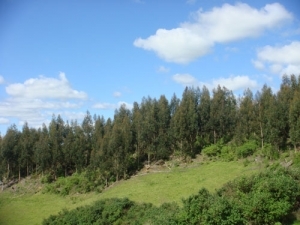Wired for Science: Understanding the feeding habits of mealybug
Fussy children might be frustrating, but fussy mealybugs could help protect the New Zealand wine industry from grapevine leafroll-associated virus 3.
 Dr Wendy McWilliam says the Government and the dairy industry need to work closely together to develop and maintain a landscape-scaled woody vegetation network on both private and public land.
Dr Wendy McWilliam says the Government and the dairy industry need to work closely together to develop and maintain a landscape-scaled woody vegetation network on both private and public land.
The cost and benefits of planting trees to help mitigate environmental effects of dairy farming need to be shared by us all for it to succeed, a new study says.
Evaluation of an agri-environmental program for developing woody green infrastructure within pastoral dairy landscapes: A New Zealand case study says Government incentive programmes are ineffective in overcoming barriers to planting such as the higher cost and slow growth of native plants, and the perception of planting being of little direct benefit to farmers' operations.
Lead author, Lincoln University landscape ecology senior lecturer, Dr Wendy McWilliam, says the Government and the dairy industry need to work closely together to develop and maintain a landscape-scaled woody vegetation network on both private and public land.
Such networks would build sustainability and resilience into New Zealand dairy farming and lead to a more equitable sharing of the benefits and costs of their, primarily, public ecosystem services.
The study's results show few farmers take advantage of Government incentive programmes, largely because they don't cover enough of the costs.
Many farmers are increasing woody vegetation, particularly around waterways and wetlands, to provide public ecosystem services, such as water cleansing and nature conservation. However, many are also removing or replanting their shelterbelts and hedges.
In addition, a significant number of farmers are not planting due to a perceived lack of sufficient private ecosystem services— the benefits the woody vegetation provides to farmers and their farm operations.
The study states a targeted environmental stewardship scheme, including more Government funding, is required to overcome the "considerable barriers to the voluntary retention and restoration of woody vegetation."
The study found plantings are small, limited to unproductive areas, and many continue to be dominated by exotics and monocultures, even though natives, broadleaf, and mixed species plantings are preferred.
Aesthetic services (or enhancing the look of the farm), as well as speed and ease of growth, maintenance, and low costs are significant factors in plant selection.
Key barriers include insufficient private ecosystem services of woody vegetation, particularly those related to dairy production, relative to other land uses; poor aesthetic services of some plantings; and low rates of growth and higher maintenance and purchasing costs of native plants.
McWilliam says farmers may also be motivated by stronger evidence in support of valued ecosystem services, their benefits and drawbacks, and information on how to support ecosystem services through planting design and management through time.
Farmers are being encouraged to take a closer look at the refrigerants running inside their on-farm systems, as international and domestic pressure continues to build on high global warming potential (GWP) 400-series refrigerants.
As expected, Fonterra has lifted its 2025-26 forecast farmgate milk price mid-point to $9.50/kgMS.
Bovonic says a return on investment study has found its automated mastitis detection technology, QuadSense, is delivering financial, labour, and animal-health benefits on New Zealand dairy farms worth an estimated $29,547 per season.
Pāmu has welcomed ten new apprentices into its 2026 intake, marking the second year of a scheme designed to equip the next generation of farmers with the skills, knowledge, and experience needed for a thriving career in agriculture.
One team with 43 head, including a contingent from Mid Canterbury, are reflecting on a stellar NZ DairyEvent.
Fonterra farmer shareholders have approved the mechanism for a $2/share capital return expected from the sale of its global consumer and associated businesses.